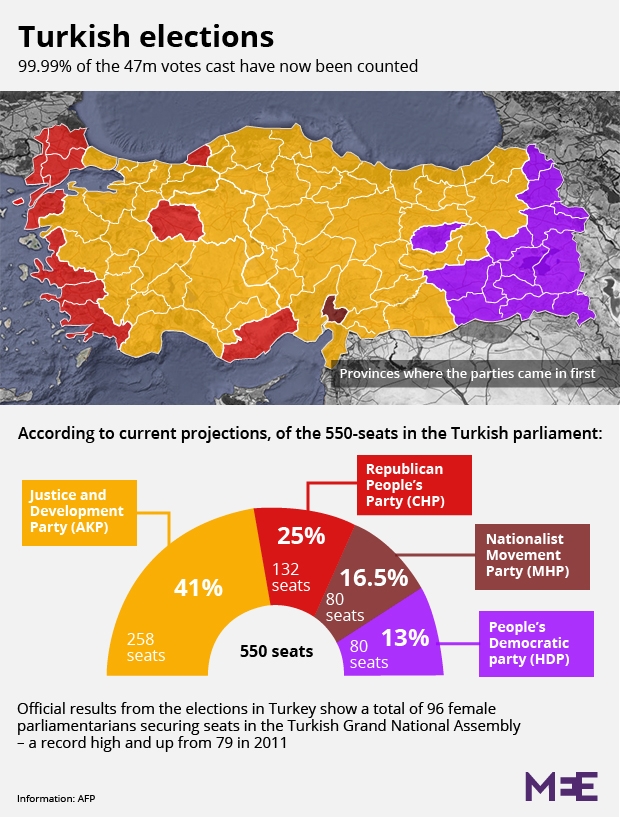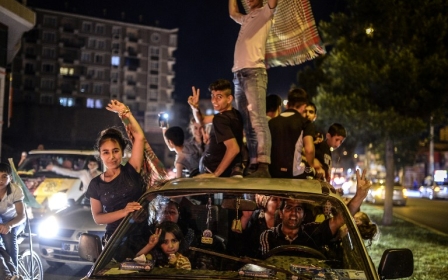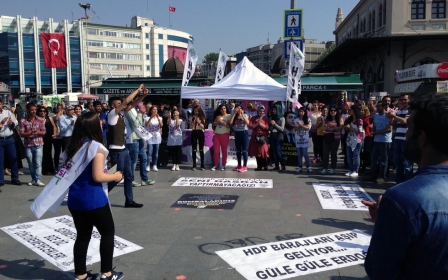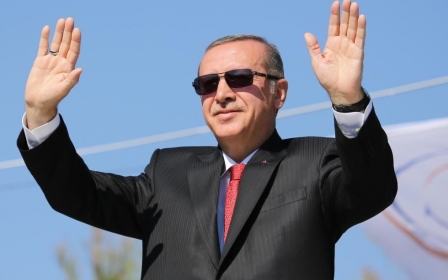ANALYSIS: Where did Turkey's AKP go wrong?
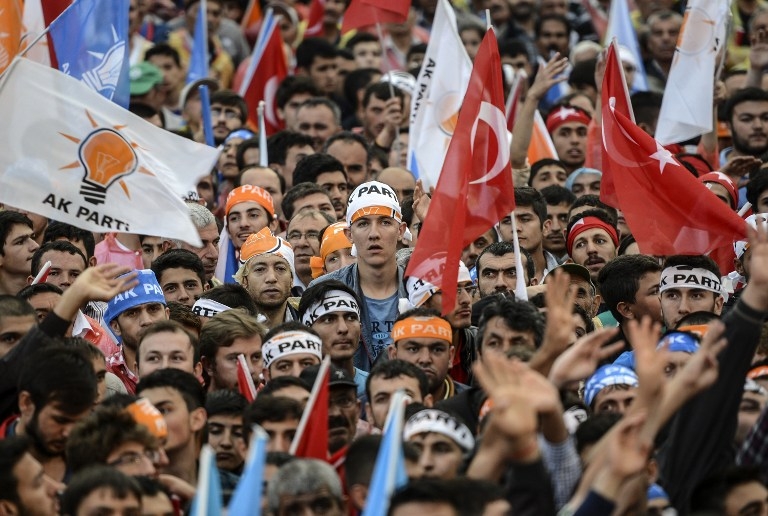
For the first time in thirteen years of single-party rule, the Justice and Development Party (AKP) has found itself unable to lead the next government without calling another snap election or securing a coalition partner.
Until today AKP had won every single poll - presidential, legislative, and municipal - without serious opposition since first coming to power in 2002 but as of Sunday it held only 258 of the 276 seats needed to form a majority in the 550-seat parliament.
But with the party’s share of the national vote shrinking from almost 50 percent from the last general election in 2011 questions are being raised about what has gone wrong?
Economic slowdown
AKP’s previous victories have been mainly attributed to economic growth as well as widespread investment in infrastructure and social services. However, according to analysts, this time around an economic slowdown has left a major group of the party’s constituency disillusioned by AKPs promises for a better future.
According to the polls, the AKP’s sway with its traditional constituency - which has included low-income communities, conservative Turks, non-secular nationalists, Kurds and even liberals – has declined, with some former supporters defecting to AKP’s opponents.
“AKP’s policy of development has been successful but it no long gives hope to low-income families,” said Burhanettin Duran, professor of political science at Istanbul Sehir University and member of the Turkey-based think tank SETA, deemed as pro-government,
“You can build a third airport in Istanbul, but for people who do not have the means to fly, this doesn’t mean anything,” said Duran referring to Erdogan’s plans for a new airport in Istanbul along with a series of other infrastructure projects.
While Duran believes another major factor behind AKP’s loss of votes is that “after three consecutive elections, the fatigue among AKP’s constituency has become apparent”, he also says that AKP has increasingly begun to be seen as an elite party – something which has caused it to lose ground with low income communities that are extremely valuable electorally.
“Because AKP has been in power for long, it has lost ties with some of the electorate. Party politics has become elitist and many of the newer members within the party could not form the [grassroots] bonds needed to get the votes,” he explained.
Segments of the opposition have moved in to fill this void and have managed to target and ultimately lure in many low income voters.
The main opposition Republican People’s Party “CHP developed a strong campaign targeting low income communities. These promises didn’t necessarily bring votes to CHP though, but they created confusion among AKP voters affecting AKP negatively,” Duran told MEE.
Aaron Stein, an associate fellow at the Royal United Security Institute (RUSI) agreed: “Although CHP have run a smart campaign that has very effectively targeted AKP’s economic policy -particularly the economic inequality and the corruption allegations - its campaigns have allowed smaller parties such as the HDP to rise instead,” he told MEE ahead of the elections.
Kurdish peace process
Apart from the economic slowdown, the precarious peace process initiated by President Recep Tayip Erdogan in 2013 has also been blamed for AKP’s fading fortunes.
The peace talks are aimed at ending decades-old insurgencies responsible for claiming the lives of some 40,000 in recent decades. For two years, the AKP was at the forefront of a negotiated ceasefire and the possibility of unprecedented Kurdish inclusion in a Turkish state that would recognise the minority’s cultural and linguistic rights.
However, the AKP-led process is seen as highly controversial in Turkey, with many voters worrying that peace could lead to greater autonomy if not outright independence for Kurdish-majority parts of Turkey.
It has also proven divisive with the nations Kurds, who make up anywhere between 10 and 20 percent of Turkey’s population of 75 million people. Since 34 people were killed in protests in support of the Kurdish majority Syrian border town of Kobane last October, many Kurds who supported the AKP have complained of being alienated and have said that they no longer have as much faith in negotiations between the Kurdistan Workers’ Party (PKK) and AKP.
Furthermore, a smear campaign led by the pro-Kurdish Peoples’ Democratic Party (HDP) alleging that the AKP supported the Islamic State (IS) against the Rojava Kurds in northern Syria has caused many Kurds to turn their backs on AKP, according to Turkish journalist and commentator Ceren Kenar.
On the other end of the political spectrum, the AKP’s peace drive managed to alienate right-wing voters who turned to the far-right nationalist and secular Nationalist Movement Party (MHP) and helped it to increase its share of the vote from 13 to more than 16 percent.
“The irony in this election is that because of the peace process, AKP could lose votes among the Kurds to the HDP, but also among the nationalists to the right-wing MHP,” Kenar said ahead of the elections.
HDP success
The rise of the pro-Kurdish HDP though has likely been the biggest setback for the AKP. The party has previously only been able to field individual candidates, but it surpassed all expectation to secure more than 13 percent of the vote, easily passing the 10 percent threshold it needed to get into parliament.
In order to do this and scoop up 80 parliamentary seats, the HDP had to go well beyond its Kurdish constituency and gain the support of groups which have traditionally been antagonistic toward the so-called Kurdish question.
Reports during the elections also showed anti-AKP voters and supporters of the secular CHP voting tactically to stop Erdogan's ambitions to establish a presidential system in Turkey.
“All of a sudden, Kurdish demands became plausible for the opposition. [Supporters of modern Turkey’s founder Kemal Ataturk the] Kemalists and [supporters of exiled Fethullah Gulen] the Gulenists who accused AKP of selling out Turkey to the Kurds two years ago are now voting for the Kurdish party,” said Kenar.
“The pro-Kurdish HDP is being perceived as the last saviour among different groups in Turkey, even those who don’t like Kurds - the nationalists and Gulenists who were against the peace process - are now potentially voting for this party.”
While the Kemalists have always been ardent opponents of the AKP, the Gulenists only turned against AKP in 2013 when an open political battle between the former allies broke a decade-long AKP-Gulenist alliance.
The key to the parliamentary arithmetic is the new element of the HDP which has also brought together young, activist liberals born of the mass protests against Erdogan’s increasing control in 2013.
In 2013 liberals and leftists became increasingly antagonised by the government after it cracked down on the Gezi Park protests which were sparked by Erdogan’s plans to build of an Ottoman-era military barrack in place of the green space, but soon developed into a hub for many groups antagonised by Erdogan.
According to Stein: “HDP [was] polling from the affluent liberal Turks and Alevis, who although [they] have traditionally voted for CHP, are attracted to the HDP’s liberal messages, on women’s rights for example.”
Erdogan’s ambitions to consolidate power through establishing a presidential system became increasingly perceived by opposition groups as a move toward autocratic rule. Dissent was coupled with sharp criticisms of government spending, specifically when Erdogan moved into a 1000-room palace that cost more than $400 million.
A coalition or re-election?
For now the AKP has sounded unsure of what to do next and whether it will agree to a snap election in 45 days or if it will push for a coalition.
The animosity and divisions between the main parties, however, are expected to frustrate any attempts at coalition-building.
A most likely option, according to most analysis, would be a coalition with the MHP. Although the MHP have currently ruled this out, such an alliance is likely to prove fatal to the PKK peace process.
“If a coalition were to be formed, it will be with MHP and one of the concerns of the HDP is that would end the peace process with the Kurds,” Stein told MEE ahead of the elections.
Another less likely scenario is an AKP-HDP coalition government. While HDP’s parliamentary inclusion and forward momentum is a historic success bringing Turkey's Kurdish minority closer to achieving linguistic and cultural rights, an AKP-HDP alliance could be detrimental for the Kurdish party which has relied on its anti-AKP campaign to garner support.
To agree on a HDP-AKP coalition, AKP would have to negotiate with the pro-Kurdish group for the passage of a new constitution which would strengthen the HDP’s hand in the peace negotiations. But such a deal risks losing the party its credibility, something which has caused the HDP to also shy away from a coalition deal.
“If an agreement is reached, that will push the [peace] process forward, but in doing so, HDP would completely destroy the trust of its constituency who voted for it because they thought it would stand up against Erdogan,” explained Stein.
With the HDP and MHP both hesitating about an AKP coalition, and dead set against a grand opposition coalition, the country is facing a period of potentially grave upheaval with reports showing the Turkish lira already plummeting and markets sliding on the election news.
This turbulence could likely well push the AKP to call another election before the 45-day window allowed to form a coalition, Duran said.
“MHP is the key party for any collation scenario. They will be under pressure from different circles to ally with AKP on one side or with HDP on the other, but so far they have faced up to this pressure and have declared the will not join any coalition,” he said.
And while a re-election may not change the current results, it may help the parties to get accustomed to the prospect of a coalition, analysts say.
“The re-election may not change anything. It’s the Turkish political elite, not the electorate, that feel the need for a re-election because they are simply not ready for a coalition,” said Duran.
“Even if the changes in the results don’t happen, the elite will then become obliged to form join hands.”
This could force the AKP to revaluate its policies in the long term, although for now Duran argues that the party will probably focus on trying to at least maintain the same number of votes for the re-election to put it in a stronger negotiating position.
“AKP is likely to try and consolidate its internal structure while also work on appealing to different sectors in society,” said Duran.
But if the early elections weaken AKP even more, the party may face internal divisions.
Potential internal divisions within AKP have surfaced since last year, but this year’s general elections may prove to be the first real crisis that openly spills into the national idea.
“AKP members will be asking what went wrong, what caused us to lose those votes. Some may point to Erdogan, while others may point to Davutoglu,” said Duran.
Middle East Eye propose une couverture et une analyse indépendantes et incomparables du Moyen-Orient, de l’Afrique du Nord et d’autres régions du monde. Pour en savoir plus sur la reprise de ce contenu et les frais qui s’appliquent, veuillez remplir ce formulaire [en anglais]. Pour en savoir plus sur MEE, cliquez ici [en anglais].


